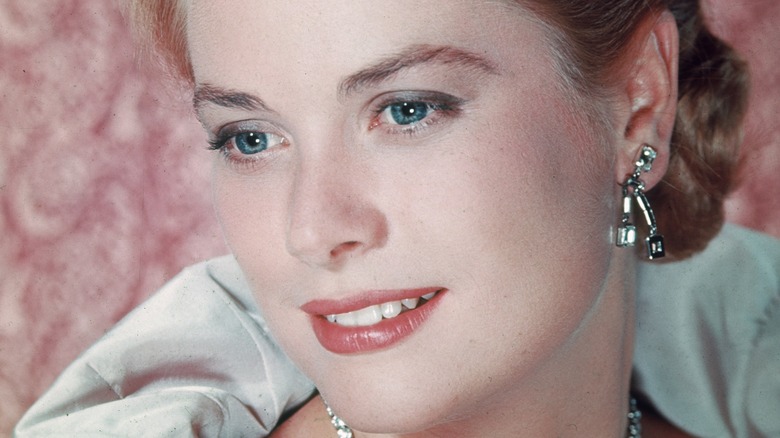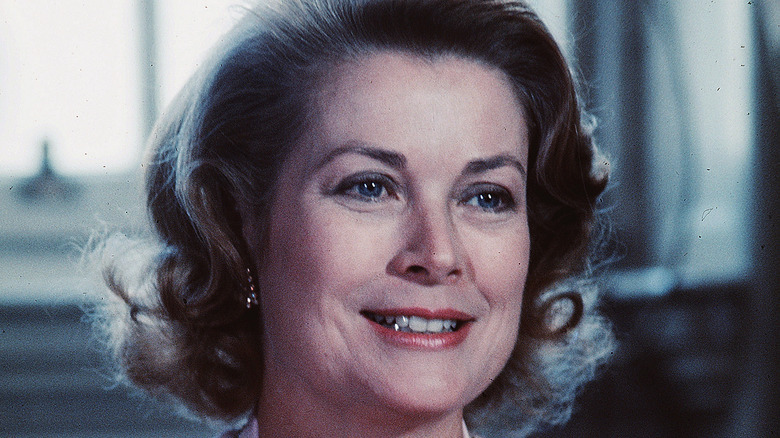The Reason Why Grace Kelly Spoke With A British-Sounding Accent
One of the biggest names in the history of cinema, particularly when talking about Hollywood's Golden Age, is Grace Kelly. Like Meghan Markle decades after her, Kelly was an American actress who married into a European royal house. As the South China Morning Post notes, she was a wealthy and famous actress at the stratospheric height of her career when she married Prince Rainier of Monaco, and though she remained a celebrity — covered dutifully by both the American and European press — she gave up her acting career when she became the Princess of Monaco.
Whenever Kelly spoke, whether on the screen or for the TV cameras, she spoke in a soft, elegant accent that, to some modern ears, may sound British. It was a type of speech that exuded class and dignity (at least, at the time; today, it sounds kind of silly and affected), and it was intended to do just that. However, it wasn't her natural speaking voice. Like other actors, Kelly had to learn a new way of speaking in order to make it in the movies, ditching the native accent she spoke before her career on film.
The Transatlantic Accent
Everybody has an accent. Even if you think you don't, you do. If you think you don't have an accent because you sound exactly like the "default" American accent used by newscasters and such, you still have an accent: the General American accent, as it's called. And the General American accent is (or was, anyway) a regional accent, developing in parts of the Midwest.
Decades ago, the default accent used in films and by radio announcers was the Transatlantic Accent, or sometimes the Mid-Atlantic Accent, according to The Intrepid Guide. But here's the thing about that particular accent: it is not "real." Accents develop naturally among people living and working together, according to Scientific American. The Transatlantic Accent, however, was specifically built from the ground up and taught to schoolchildren (in particular, children at snooty boarding schools). It was intended to represent the "best" of the American and British accents — representing class and dignity — while not favoring either of them. As such, it became the default accent used by radio announcers and, as it relates to Grace Kelly, actors on the screen.
Kelly's natural accent was probably a Philadelphia accent since that's where she was born and raised, according to Britannica. But once she got into acting, she used the Transatlantic, and she kept it whenever she spoke to the cameras (it pays to stay in character).
What Happened To The Transatlantic Accent
These days, the Transatlantic Accent exists mostly as a joke, according to The Intrepid Guide, a sort of shorthand to point out that someone is a pretentious snob. Frasier Crane (Kelsey Grammer) and his brother, Niles (David Hyde Pierce), both use it on "Frasier," as does the villain in "Titanic," Caledon Hockley. So what happened to the accent? Blame World War II, says linguist William Labov, via The Intrepid Guide. "This American version of a 'posh' accent has all but disappeared even among the American upper classes," he wrote.
The Transatlantic Accent was mostly replaced, in a manner of speaking, by the General American accent — you don't hear late-night host Stephen Colbert speaking in his natural South Carolina accent, for example (per Atlas Obscura). As for why, that remains unclear, but in his book, "Word on the Street: Debunking the Myth of 'Pure' Standard English," author John McWhorter posits that after WWII, the broadcast industry began favoring a "heartland" accent and landed on the General American accent which, as mentioned above, is actually a Midwestern regional accent.


